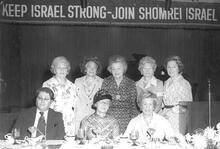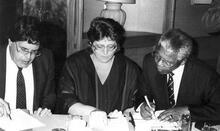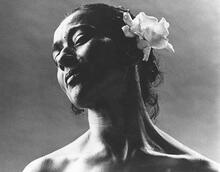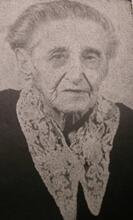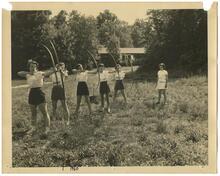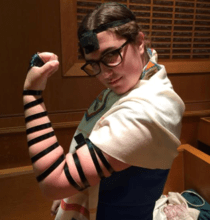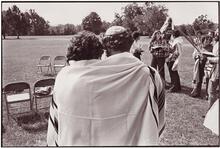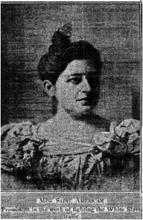Irma Rothschild Jung
Irma Rothschild Jung, a native of Randegg, Baden, Germany, was born on July 1, 1897, and until her death close to a century later, dedicated her substantial energies to pioneering Jewish communal programs in aid of the needy. Educated in Switzerland, Jung was active in response to the needs of Jewish communities after World War I. After immigrating to the United States with her husband, Leo Jung, Jung continued her communal activism and charitable work, feeding and clothing students during the Great Depression, along with other charitable efforts. Her leadership and influence were deeply felt in the broader Jewish community by the countless individuals, young and old, who benefited from her generous spirit.
Family and Early Life
Irma Rothschild Jung, a native of Randegg, Baden, Germany, was born on July 1, 1897, and until her death close to a century later, dedicated her substantial energies to pioneering Jewish communal programs in aid of the needy. Her maternal family, the Langs, had a written code of ethics, based upon observance and practice of Judaism, which served as a blueprint for family behavior in the public and private sectors. This code would guide Jung’s service to others for her entire life.
One of twelve children, Jung was educated in Switzerland, attending the University of Zurich from 1917 to 1919. In response to the needs of the Jewish communities after World War I, Jung served as the director of the Bureau of the World Congress of Orthodox Jewry in 1919, and of the Central Bureau of the Agudath Israel World Organization from 1919 to 1921. She organized free camps for refugee children in Stansstad, Switzerland, from 1920 to 1921.
Activism
On February 28, 1922, she married Leo Jung, a Moravian-born and London-educated rabbi in Germany. That same year, the couple came to New York, where Rabbi Jung would further a blossoming career as a charismatic Orthodox spiritual leader, activist, thinker, and writer. Going beyond her considerable duties as the (Yiddish) Rabbi's wife; title for a learned or respected woman.rebbetzin of the Jewish Center, a fast-growing and increasingly influential modern Orthodox congregation, Jung continued her communal activism and charitable work on new shores.
Her concern and provision for the feeding and clothing of students at New York’s Yeshiva University during the Great Depression is legendary. She served as chair of the Yeshiva Dormitory on East Broadway from 1926 to 1928, and as vice president and acting chair of the Yeshiva College Women’s Organization in 1934–1935. With funds collected by fellow committee members, Jung would provide stipends to needy students every Sunday. Before A seven-day festival to commemorate the Exodus from Egypt (eight days outside Israel) beginning on the 15th day of the Hebrew month of Nissan. Also called the "Festival of Mazzot"; the "Festival of Spring"; Pesah.Passover, she would appear with bolts of cloth, offering students a choice of a new brown suit or a new gray suit.
Together with her husband, Jung labored for many years on behalf of the Rabbonim Aid Society, whose center of operations was located at the Jewish Center. Some of Rabbi Jung’s associates—particularly victims of the Holocaust—as well as rabbinical widows were impoverished. The Jungs raised much-needed funds in order to send monthly checks to numerous rabbis and widows from the 1950s onward.
Jung was a founder of the women’s branch of the Union of Orthodox Jewish Congregations of America, spearheading the effort to involve women in the union’s activities promoting Jewish life.
The Jungs also devoted their energy to at least a dozen causes in Palestine and Israel. They championed schools and social services, and were recognized by rabbinical colleagues and friends with the July 1983 dedication of the Rabbi Leo and Irma Jung Forest in Safed, Israel.
Jung and her husband raised four daughters: Erna Villa, Rosalie Rosenfeld, Julie Etra, and Marcella (Micki) Rosen. Long after her arrival in America, Jung retained a bit of her Swiss background. As a young girl, she had enjoyed mountain climbing, and in her later years would yodel at the request of her grandchildren. After her husband’s death in 1987, she continued to be a formidable presence at the Jewish Center. Her leadership and influence were deeply felt in the broader Jewish community by the countless individuals, young and old, who benefited from her generous spirit.
Irma Jung died in New York on May 22, 1993.
Jung, Leo. The Path of a Pioneer: The Autobiography of Leo Jung (1980).
Miller, Rabbi Israel, and Rosen, Micki. Telephone conversations with author, summer 1996.
Rosenfeld, Ezra [grandson]. Correspondence with author, Alon Shvut, Israel, summer 1996.
Schacter, Jacob J. Telephone conversation with author, summer 1996.
Schacter, Jacob J., ed. Reverence, Righteousness, and Rahamanut: Essays in Memory of Rabbi Dr. Leo Jung (1992).
Sherman, Moshe D. Orthodox Judaism in America: A Biographical Dictionary and Sourcebook (1996).
WWIAJ (1938): 496.



